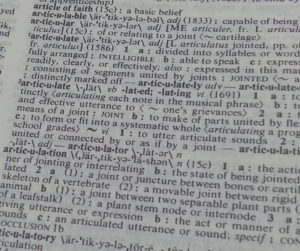
The following article was my inaugural submission for the Examiner back in November of 2012, and it’s very appropriate for my inaugural post on the Big Words Blog Site. It hit upon one of the main themes of this site; the use of articulate speech. One of the major rules for contributing to the Examiner was not writing in the first person point of view, something the publication policed very closely. Hence in the piece, I’m not referring to myself directly.
Using Big Words
“Why do you use those big words all of the time?” a middle school student was asked by his classmates in the late 1980s. It was a diverse school, but these particular students were from the east side of Buffalo, for the most part, consisted of African American families.
Articulate speech, and big words were normal in his home. Both of his parents were college educated. His mother encouraged learning professional skills such as using proper typing techniques, though the importance of such skills were not well understood at the time by her sons. There were also plenty of books to read in the house. Public speaking was also encouraged at Sunday School every week at church.
Using big words helped him to earn his Ph.D. from a world renowned university. They allowed him to make very technical presentations, publish research articles, and to present himself well on job interviews.
As a scientist within the federal government, he made decisions that affected the health of the entire United States population. Articulate speech, the use of big words, and proper grammar were a part of his job performance; whether it was setting new policies, preparing documents, making presentations, and even collaborating with colleagues in foreign nations.
Articulate Speech
Ultimately being a major part of his success, his articulate speech caused difficulties throughout his life, particularly as a youth where it made him stand out from his peers, causing him to be perceived as different. He later found that being different was actually okay. As an adult, people continued to form opinions about him, positive or negative, based upon the way that he spoke. Nevertheless, his articulate speech ultimately opened several doors for him as he grew older.
The United States faces several challenges in the 21st century, one being the competition with other countries in the STEM fields (Science, Technology, Engineering and Mathematics). A strong command of the English language is key for success in these fields. Asia’s brightest scientists, for example, spend considerable time and energy learning the English language in order to establish their careers in the United States.
Speaking and writing often go hand in hand. In his book, Inside American Education, Thomas Sowell writes that the educational system in the United States needs to get back to the basics of teaching children how to read, write and how to do mathematics. The late Dr. Joseph Fail, Jr., of Johnson C. Smith University, published numerous articles encouraging students to be able to write effectively, particularly students of color.
Big Words and Race
In some communities speaking articulately is viewed as speaking proper or ‘white’. It also represents not having ‘street credibility’, which can be very important at an early age and even in adulthood, depending upon the social circle. This can be devastating for young people, ultimately locking them out of opportunities later in life.
In the Rich Dad Poor Dad series by Robert Kiyosaki, several compelling arguments are made for expanding one’s vocabulary, and ultimately speaking correctly. Even though financial literacy is the focus of the book, the importance of words is discussed as well. Robert eloquently describes words as important tools that unlock doors to life’s multiple possibilities.
Young people (and adults) need encouragement to the extent that a large vocabulary and articulate speech are valuable assets. They need affirmations that it is okay to read books and to speak well, even though it may make them feel different than their peers. They need confirmation that having a strong command of the English language is important in that it creates opportunities, opens doors, and builds bridges no matter what the professional field or discipline.
The Engineers: A Western New York Basketball Story Part One is available in the eBook, Hardcover and Paperback Editions
Writing a book was the genesis of my blogging and becoming a video content creator. I have published part one of my book project entitled, The Engineers: A Western New York Basketball Story. It is currently available on Amazon in eBook, hardcover, and paperback formats. The paperback format is available on IngramSpark, and signed hardcover and paperback copies on my online store entitled Big Words Authors via credit payment. Payment using Cash App, PayPal, Venmo and Zelle are also available. Reach out to me for further details. Finally visit the page discussing the book. Please consider visiting it to learn more about the project and see promotional content I’ve created surrounding the project.

Great piece of writing: Articulate and easy to follow!
Thanks for the information!!
The contents of this article resonated with me on many levels. While I find it an underhanded compliment when I am referred to as articulate, I understand where it has taken me and the rooms I’ve been able to speak myself into. I’ve clung to my passion for writing and speaking concisely when I’ve felt at a loss for much else. Glad to know someone else can relate.
Hey lady. Thank you for taking a look at this and for your support in general. Yes with our backgrounds, there are a lot of challenges on the way up. Surprisingly one of the major ones is education and peer acceptance.